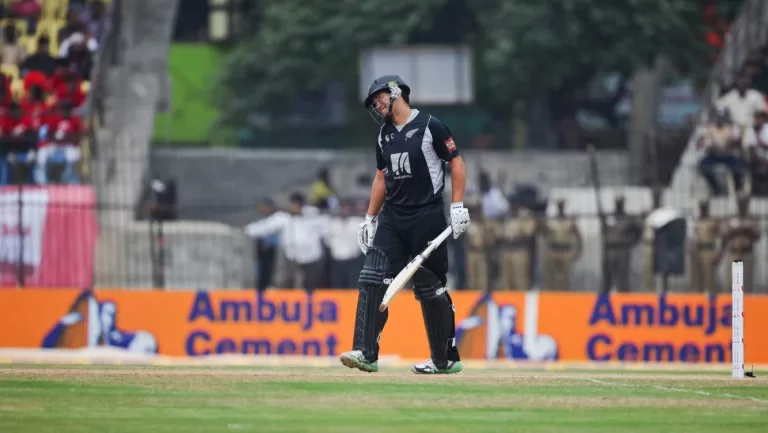In Mitchell Santner’s words: “When they’re (Pakistan) hot, they’re really hot.” And after the game against New Zealand, it doesn’t look like cooling them down will be an easy task…
It was a rainy morning in Birmingham. The day Pakistan and New Zealand were to meet in an all-important encounter. A win for New Zealand would’ve guaranteed them a place in the semi-final, while a win for Pakistan would’ve kept their own semi-final hopes alive. The wet outfield delayed the toss and Pakistan couldn’t afford another washout – but perhaps it was the prayers of their innumerable supporters that allowed the covers to come off without any overs lost.
When the two teams walked into the stadium, it was a sea of green in the stands. There was unreal support for the Pakistan team and maybe it was the form they get into when it’s a do-or-die match or the support from their 12th man (the crowd), but they got off to a flying start. New Zealand had won the toss and chosen to bat first. Little did they know, they were about to be blown away. The Pakistani bowlers, one by one, ripped their batting line-up apart. Everything was going Pakistan’s way, and the noise in the stadium was deafening. Green flags waving everywhere and chants alternating between “Shaheen, Shaheen, Shaheen”, “Amir, Amir, Amir” and “Pakistan jeetay ga”.
Pakistan have come into this game pumped up! 🔥 💪 #CWC19 | #NZvPAK | #BACKTHEBLACKCAPS | #WeHaveWeWill pic.twitter.com/2kC0nxgCf4
— ICC (@ICC) June 26, 2019
New Zealand’s first wicket fell for 5 in the 2nd over and they kept falling until they were struggling at 46/4. The Kiwi captain, Kane Williamson, stayed for a bit before being dismissed by Shadab Khan when New Zealand were at 83. That is when Jimmy Neesham and Colin de Grandhomme took charge. Brilliant batting by these two, under pressure, allowed their team to post a total of 237 on the board.
The total, albeit low, appeared competitive given how the pitch had started to behave. Pakistan were off to a typically shaky start. The first wicket fell for just 19 runs as Fakhar Zaman was dismissed, while Imam-ul-Haq followed shortly after at 44. With two early dismissals and both openers gone, a wave of fear and doubt took over fans in the stadium and at home. They had seen their team collapse from very comfortable positions before. Early signs of a similarly disappointing ending has begun to appear. All eyes were now on Mohammad Hafeez and Babar Azam as Pakistan needed match-winning contributions from both players.
Babar Azam's hundred is Pakistan's first World Cup century scored by a non-opening batsman since…1987!#CWC19 | #NZvPAK | #WeHaveWeWill pic.twitter.com/EJzm7kMHVy
— Cricket World Cup (@cricketworldcup) June 26, 2019
Much to everyone’s dismay, Hafeez lost his wicket to a part-timer and Pakistan were 110 for 3. Then walked out Haris Sohail, the hero of the match against South Africa. With their hearts beating fast, the fans were still praying for success – and it worked. An excellent partnership between Babar and Haris saw Pakistan gain the momentum needed for a comfortable chase. Things started going their way, as is often the case when it’s Pakistan’s day.
The crowd was buoyant again and the cheers got louder by the minute. Babar and Haris both notched fifties, with the former going on to convert his into a hundred. The whole of Edgbaston was on its feet when one of the finest Pakistani batsmen in the recent history completed his first World Cup century. It’s difficult to pick when the loudest roars were heard during the match, with a toss up between when Amir took a wicket off his first ball; when Sarfaraz took that acrobatic catch off Shaheen’s bowling; or when Babar completed his century. Pakistan won the match by 6 wickets with 5 balls remaining.
Babar Azam, you star! And don't they love it! #CWC19 | #NZvPAK | #WeHaveWeWill pic.twitter.com/gUktRTxuS6
— Cricket World Cup (@cricketworldcup) June 26, 2019
This win was more than just a win for Pakistan. New Zealand were unbeaten in this World Cup and to have defeated them in such an assured manner surely means something. Something more than just Pakistan staying in the race for the semis. Maybe the team was finally trading its unpredictability for consistency, and bouncing back in tournament. And surely, they’re not done just yet.
The match had all the signs of a magical comeback from Pakistan. There was madness. Shaheen, who’d been out of form for so long had finally clicked. Babar, who’d been struggling to convert his double digits into triple digits, had finally gone the distance. There’s very little to do with logic here (as is often the case with Pakistan) and a lot to do with unbridled insanity. Maybe, just maybe, the other Pakistan has finally arrived.
"It feels like we're in Pakistan. This certainly isn't Birmingham." @ZAbbasOfficial met with some delighted 🇵🇰 fans immediately after their team's victory against New Zealand.#CWC19 | #WeHaveWeWill pic.twitter.com/9oipqfH10O
— Cricket World Cup (@cricketworldcup) June 26, 2019
